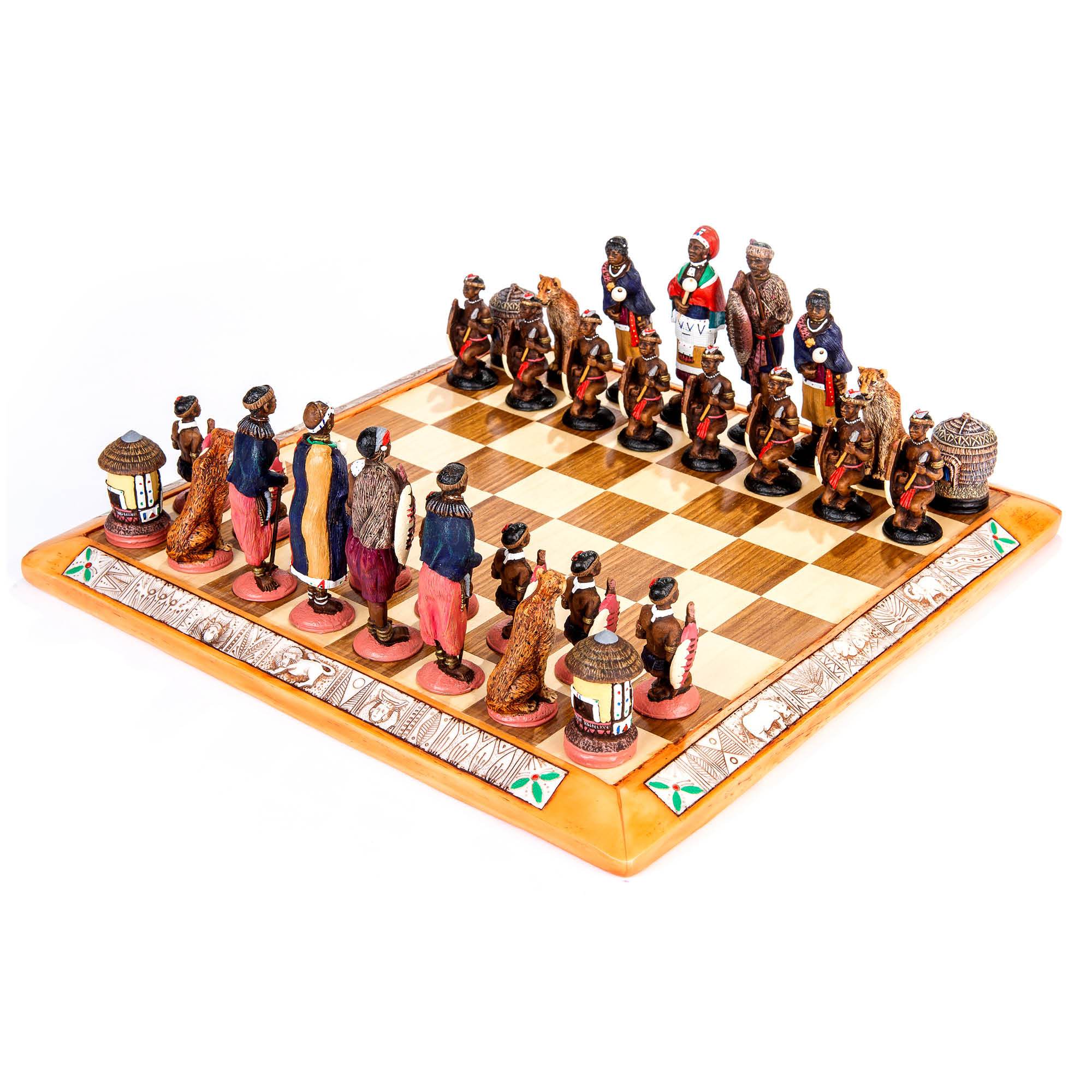







African Chess Set - Zulu / Ndebele (Large)
- 30+ FREE Gifts with Purchase

Chess House Guarantee
- Easy parts. When buying a chess set online, we've got you covered. With us, you have easy access to parts for years so your set is always playable.
- Safe, timely arrival. Every order is thoughtfully packed. Plus, delivery time is clear from checkout until it reaches your door.
- Peace of mind. Easy access to our friendly experts and 90 day, no-hassle returns.
That's why 22,145 people rate Chess House 4.8 out of 5 stars.
Mark (Verified Buyer)
Always fast, efficient, packed well, and good updates and communication on order even if just email.
About The African Chess Set - Zulu / Ndebele (Large)
This African Chess set with Authentic Zulu/ Ndebele designs invites you to reflect on the struggle of two great and powerful ethnic groups battling it out for supremacy.
This chess set will immerse you in the titanic struggle for supremacy between the Zulu and Ndebele tribes that shaped the future of South Africa. This impressive, larger than normal chess set, helps you see the equally powerful Zulu and Ndebele tribes as they were, in a defining moment in their history;
The chess set is proudly made by local artists in South Africa who want to share their heritage and talents with others around the world. It includes both the African Chess Board as well as African Tribal Chess Pieces.The Pieces
The chess pieces are molded from high-quality Polystone (resin & stone) that offers a smooth porcelain-like finish and then meticulously hand-painted by talented African artists who only use the best oil paints to deliver incredibly detailed designs.
- The king - Ndebele chief/Zulu chief
- The queen - Ndebele matron/Zulu matron
- The knight - cheetah/lioness
- The bishop - Ndebele witchdoctor/Zulu Sangoma
- The rook/castle - Ndebele hut/Zulu hut
- The pawn – Ndebele warrior/Zulu warrior


Chess Board:
The solid, durable wooden chess board is finished off with a beautiful hand painted Polystone frame


Both the set’s chess pieces and board frame are cast by hand in polystone (a unique mixture of crushed stone and resin) and painted by hand in incredible detail by exceptionally talented team of South African artists using high-quality Winsor and Newton oil paints. The wooden chess board itself is also carved by hand, as are the molds that are used for the chess pieces. The molds for the pieces in the small set are exactly the same design as in the larger set and are made to scale using 3D printing. The pieces in the smaller set are also cast and painted by hand.
The board squares are hand carved from koto and cherry wood, and then treated in accordance with international import standards and requirements. The board is then set in its polystone frame which boasts a stunning African design.
Each set (board, pieces and frame) takes approximately nine (9) hours to be crafted from start to finish by our extremely skilled and talented artisans and craftspeople, with some time allocated during the process for the paint to dry.
We take great care in packing these gorgeous chess sets, such that they are delivered to you safely and in their entirety after the shipping process.
Every individual chess piece is set in their own box-dye cut foam holder, accompanied by extra foam top and bottom covers for the set as a whole. Additionally, the wooden board is wrapped in bubble wrap so that it can absorb any shock while in transit, without sustaining any damage.
The complete set is placed in a sturdy double-walled cardboard box which contains polystyrene packing peanuts which further protect the chess set during shipping. We know that accidents do happen – so, if any pieces arrived damaged, we will replace them entirely at no cost to you.
THE HISTORY BEHIND THIS CHESS SET
Relive the struggle of two great and powerful ethnic groups battling it out for supremacy. Our chess set will immerse you in the titanic struggle for supremacy between the Zulu and Ndebele tribes that shaped the future of our country. This impressive, larger than normal chess set, helps you see the equally powerful Zulu and Ndebele tribes as they were, in a defining moment in their history;
In the early 19th Century. Two warriors, both of royal bloodline, engaged in a feud that would eventually split the Zulu empire. On the one side you had Shaka Zulu (the Zulu King), who had had his half-brother Sigujana assassinated. On the other side you had Mzilikazi Khumalo, the son of one of Shaka's greatest lieutenants.
Admired by many and feared by all, Shaka swore loyalty to all those who could benefit his tribe while eliminating any rebellion that came his way. Considered a great military tactician in his day, Shaka built his empire on conquest and intimidation. With Shaka, there was only one way, which was his way.
One of these alliances Shaka had struck, was with the Khumalo Clan Chief; Matshobana. Matshobana became an essential part of Shaka’s inner circle and was asked to attack a rouge clan. In the battle, Matshobana was killed, but instead of Shaka repatriating Matshoban’ body back to his tribe for proper burial, he left Matshobana’s body behind. This act of betrayal and dishonor incensed Matshobana’s son Mzilikazi.
Even though Mzilikazi was deeply offended by the insult to his clan and his family, he sought power more than anything and joined the Zulu army. He started moving up in the Zulu ranks to the point where he became a trusted advisor to Shaka. The problem was that Shaka was more famous for ruling with an iron fist than for his generosity and Mzilikazi soon realized that the Zulu king would never give him the honor and status that he felt he deserved.
After coming to the realization that his faith was misplaced in Shaka, Mzilikazi planned to betray the fiercest and most feared African leader of all times.
The plan was simple. Mzilikazi knew that he would be sent out to war with disobedient clans in the future, but instead of him claiming victory in the name of Shaka, he decided to claim the spoils of war for himself. And so events unfolded just as Mzilikazi predicted. Shaka incensed by the disobedience of yet another clan, appointed Mzilikazi to make an example of them and dispatched Mzilikazi and his troops. Mzilikazi fought the battle and won, but instead of paying homage to Shaka, claimed victory for himself and declared himself king of a new tribe that he called the Ndebele.
Outraged by the news Shaka demanded the ritual execution of Mzilikazi and the destruction of the Ndebele tribe. The Zulu’s gathered their forces and marched to the Ndebele’s, hell bent on revenge. But Mzilikazi, was a clever warrior that had intimate knowledge of Zulu battle strategy. When the Zulu’s came for the Ndebele’s, Mzilikazi and his troops were ready for them and defeated the Zulu horde.
The battle however took its toll on Mzilikazi and he realized that Shaka would keep sending more troops until the Ndebeles were wiped out. In order to protect his tribe, he decided that retreat was the only option that would ensure the safety of his people.
So, Mzilikazi fled from Kwazulu Natal. That started a long journey for the Ndebele people who eventually relocated to what is today called Matabeleland (near Bulawayo in Zimbabwe).





